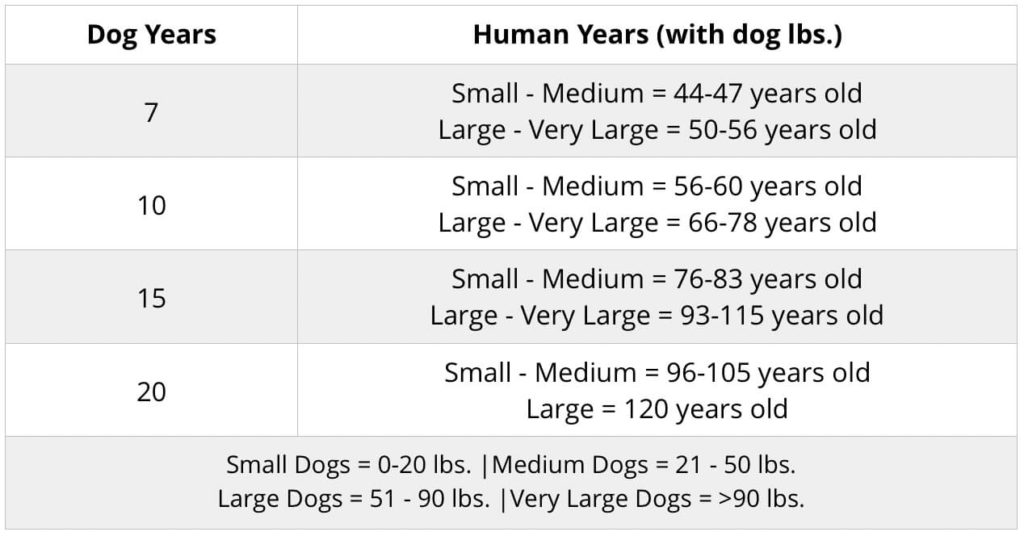Caring for Senior Dogs

Caring for Senior Dogs
If you have one, you know that caring for senior dogs is a special time in your life and theirs. Thanks to advances in veterinary health, our companions are able to live longer than before. However, senior dogs can face some challenges that weren’t part of their youth. We want to talk about some of these challenges and special needs to help you be the best dog parent you can be.
How Old is ‘Old’?
Just like humans, feeling old depends on a few different factors. These can include breed of dog and overall health. Some may develop age related problems sooner or later in life than what is a predicted average.
With those items in mind, the American Veterinary Medical Association notes these general average comparisons for dogs and their equivalent human age:

Health Related Issues
Older dogs will often develop age-related issues. Of these, some we may be able to notice simply because we know our pet so well. There may be sudden or gradual changes in our pet such as joint issues, overall weakness, or potentially senility.
Other issues will require the assistance of your veterinarian. These issues can include cancer, heart disease, kidney/urinary tract disease, liver disease, or diabetes. Not all dogs suffer from all of these issues, and so it is just best to be aware and to have a good relationship with your vet.
Regular Veterinary Visits
Once you dog begins to age, your vet may recommend semi-annual visits instead of the usual annual visits.
Your vet will be looking for potential signs of trouble or discomfort at this stage of your dog’s life. Your vet may also start to include additional blood tests or mobility checks.
Considerations for Senior Dogs
Not unlike humans, caring for senior dogs often includes that we make some changes to ensure the best care, comfort and health of our furry loved one.
It may be time to consider some of the following if your dog is showing signs of age.
Change in Diet: Older dogs may need food that is more easily digested and/or have different ingredients and calorie make-up.
Weight Control: In combination with a change in diet, ensuring that your dog doesn’t become overweight will ward off weight-related health issues.
Disease Prevention: As they age, senior dog’s immune systems aren’t as robust as when they were younger making it harder for them to fight off disease. Talk to your vet about improving parasite control for your pup.
Staying Active: Keeping your dog moving through appropriate exercise will help them maintain mobility as they age.
Vaccination Changes: Talk with your vet about your aging dog to see if a different vaccination program is appropriate for them.
Mental Health: Our dogs can begin to show signs of senility and cognitive dysfunction. Try to keep them mentally active through different interactions (e.g., new places, personal interactions etc.). If you notice unusual behavior in your dog, please consult with your vet.
Their Environment: As they get older, senior dogs may need to avoid stairs, spend more time indoors, spend less time with other dogs, or require different sleeping arrangements.
Doggie Supplements?
It’s a good time to be caring for a senior dog. The market offers several health supplements for dogs that can help mitigate some of the age related symptoms they may be experiencing. Of course, check with your veterinarian before starting any new supplement for your pet.
For instance, did you know that a supplement of glucosamine can help restore joint fluid which will reduce their joint pain? You may also want to investigate elk velvet antler for their immune system. And, fish oil for improved mobility.
We want you and your dog to be together as long as possible. With attention to their changing needs, you can help your dog to live a longer and happy life.
For more information about this subject or general questions you can contact:
Courie Dennis with Posh Paws Pet Care, LLC
843.900.0438
Visit our website at PoshPawsPetCareSC.com
Or send us a note from our contact page here.
Courie Dennis with Posh Paws Pet Care, LLC
843.900.0438
Visit our website at PoshPawsPetCareSC.com
Or send us a note from our contact page here.
